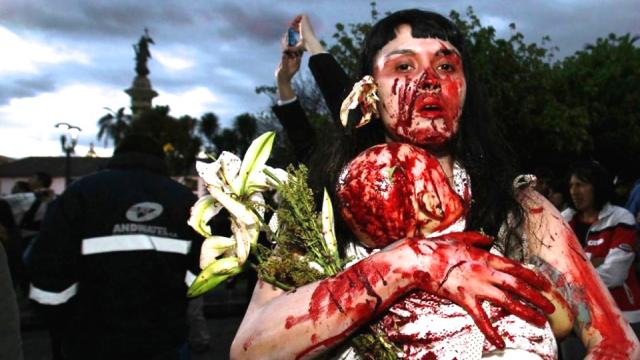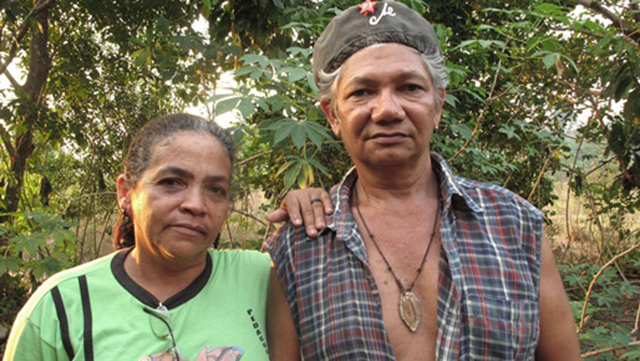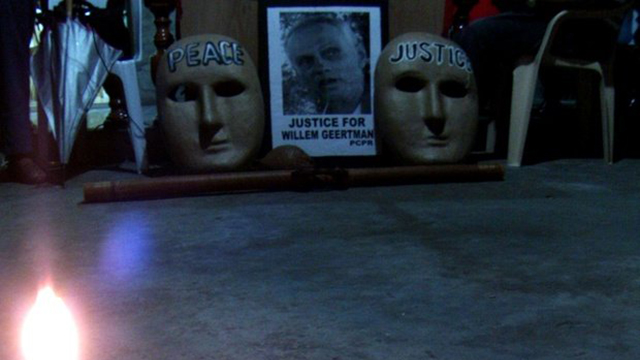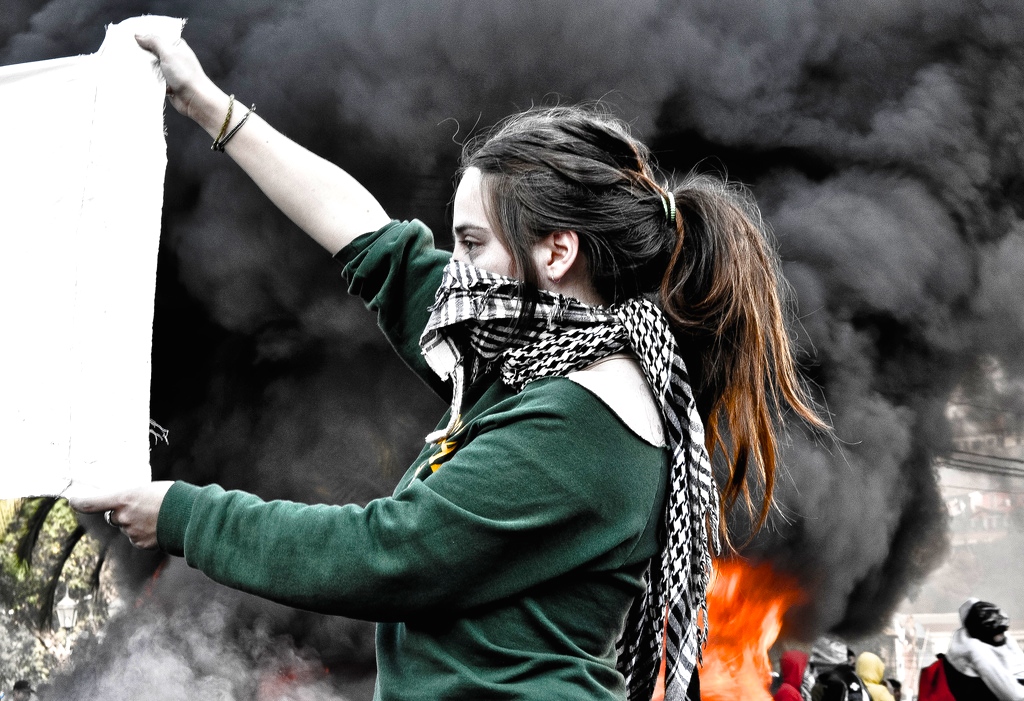
As head of his village, Prajob Naowa-opas battled to save his community in central Thailand from the illegal dumping of toxic waste by filing petitions and leading villagers to block trucks carrying the stuff -– until a gunman in broad daylight fired four shots into him.
A year later, his three alleged killers, including a senior government official, are on trial for murder. The dumping has been halted and villagers are erecting a statue to their slain hero.
But the prosecution of Prajob's murder is a rare exception. A survey released last week – the first comprehensive one of its kind – says that only 10 killers of 908 environmental activists slain around the world over the past decade have been convicted.
The report by the London-based Global Witness, a group that seeks to shed light on the links between environmental exploitation and human rights abuses, says murders of those protecting land rights and the environment have soared dramatically. It noted that its toll of victims in 35 countries is probably far higher since field investigations in a number of African and Asian nations are difficult or impossible.
"Many of those facing threats are ordinary people opposing land grabs, mining operations and the industrial timber trade, often forced from their homes and severely threatened by environmental devastation," the report said. Others have been killed over hydro-electric dams, pollution and wildlife conservation.
The rising deaths, along with non-lethal violence, are attributed to intensifying competition for shrinking resources in a global economy and abetted by authorities and security forces in some countries connected to powerful individuals, companies and others behind the killings.
Three times as many people died in 2012 than the 10 years previously, with the death rate rising in the past four years to an average of two activists a week, according to the non-governmental group. Deaths in 2013 are likely to be higher than the 95 documented to date.
The victims have ranged from 70-year-old farmer Jesus Sebastian Ortiz, one of several people in the Mexican town of Cheran killed in 2012 while opposing illegal logging, to the machine-gunning by Philippine armed forces of indigenous anti-mining activist Juvy Capion and her two sons the same year.
Brig. Gen. Domingo Tutaan Jr., who heads the Philippine military's human rights office, told the Associated Press that a military investigation showed the three died in crossfire as troops clashed with suspected outlaws. "We don't tolerate or condone human rights violations and we hope Global Witness can work with us to pinpoint any soldier or officer involved in those killings," Tutaan said.
Brazil, the report says, is the world's most dangerous place for activists with 448 deaths between 2002 and 2013, followed by 109 in Honduras and Peru with 58. In Asia, the Philippines is the deadliest with 67, followed by Thailand at 16.
"We believe this is the most comprehensive global database on killings of environment and land defenders in existence," said Oliver Courtney, senior campaigner at Global Witness. "It paints a deeply alarming picture, but it's very likely this is just the tip of the iceberg, because information is very hard to find and verify. Far too little attention is being paid to this problem at the global level."
Reports of killings, some of them extensive, from countries like Central African Republic, Zimbabwe, and Myanmar, where civil society groups are weak and the regimes authoritarian, are not included in the Global Witness count.
By contrast, non-governmental organizations in Brazil carefully monitor incidents, many of them occurring in the Amazon as powerful businessmen and companies move deeper into indigenous homelands to turn forests into soya, sugar cane and agro-fuel plantations or cattle ranches.
Clashes between agribusiness and the Guarani and Kuranji people in the Amazon's Mato Grosso do Sul province accounted for half of Brazil's killings during 2012, the report said. Human rights groups and news reports say killings are often carried out by gunmen hired by agricultural companies.
In Thailand, Sunai Phasuk of the U.S.-based Human Rights Watch echoed the report's assertion that an "endemic culture of impunity" was prevalent, and that governments and their aid donors must address this.
Prosecution of Prajob's suspected killers, Sunai said, was a "welcome rarity" in a country where investigations have been characterized by "half-hearted, inconsistent, and inefficient police work, and an unwillingness to tackle questions of collusion between political influences and interests and these killings of activists."
"The convicted tend to have lowest levels of responsibility, such as the getaway car driver. The level of impunity is glaring," he said.
After Prajob's murder, villagers lived in fear but in the end decided to sue the illegal dumpers and landfill owners, said the victim's brother, Jon Noawa-opas.
"Prajob's death has led us to fight for justice in this town," he said. "We can be disheartened and we were, but we also know that we have to do the right thing for our community."
*
Additionally, Michelle Tullo reported for Inter Press Service that indigenous leaders are being increasingly targeted in their battle to protect forests:
Indigenous leaders are warning of increased violence in the fight to save their dwindling forests and ecosystems from extractive companies.
Indigenous representatives and environmental activists from Africa, Asia, Australia and the Americas met over the weekend here to commemorate those leading community fights against extractive industries. The conference, called Chico Vive, honoured Chico Mendes, a Brazilian rubber-tapper killed in 1988 for fighting to save the Amazon.
The gathering also recognised leaders who are continuing that legacy today.
“His struggle, to which he gave his life, did not end with his death – on the contrary,” John Knox, the United Nations independent expert on human rights and the environment, said at the conference. “But it continues to claim the lives of others who fight for human rights and environmental protection.”
A 2012 report by Global Witness, a watchdog and activist group, estimates that over 711 people – activists, journalists and community members – had been killed defending their land-based rights over the previous decade.
Those gathered at this weekend’s conference discussed not only those have been killed, injured or jailed. They also shared some success stories.
“In 2002, there was an Argentinean oil company trying to drill in our area. Some of our people opposed this, and they were thrown in jail,” Franco Viteri, president of the Confederation of Indigenous Nationalities of the Ecuadorian Amazon, told IPS.
“However, we fought their imprisonment and the Inter-American Court of Human Rights ruled in our favour. Thus, our town was able to reclaim the land and keep the oil company out.”
Motivated by oil exploration-related devastation in the north, Ecuadorian communities in the south are continuing to fight to defend their territory. Viteri says some communities have now been successful in doing so for a quarter-century.
But he cautions that this fight is not over, particularly as the Ecuadorian government flip-flops on its own policy stance.
“The discourse of [President Rafael] Correa is very environmentalist, but in a practical way it is totally false,” he says. “The government is taking the oil because they receive money from China, which needs oil.”
China has significantly increased its focus on Latin America in recent years. According to a briefing paper by Amazon Watch, a nonprofit that works to protect the rainforest and rights of its indigenous inhabitants, “in 2013 China bought nearly 90% of Ecuador’s oil and provided an estimated 61% of its external financing.”

The Little Dance
Many others at the conference had likewise already seen negative impacts due to extractives exploration and development in their community.
“We have oil and gas, mines, we have forestry, we have agriculture, and we have hydroelectric dams,” Chief Liz Logan of the Fort Nelson First Nation in British Columbia, Canada, told IPS.
“Right now in our territory we can’t drink the water because it’s so contaminated from the hydrocarbons from the oil and gas industry … The rates of cancer in our community are skyrocketing and we wonder why. But no one wants to look at this, because it might mean that what [extractives companies] are doing is affecting us and the animals.”
Logan described the work of protecting the community as a “little dance”: first they bring the government to court when they do not implement previous agreements, then they have to ensure that the government actually implements what the court orders.
Others discussed possible solutions to stop the destruction of ecosystems, and what is at stake for the communities living in them. The link between local land conflicts and global climate change consistently reappeared throughout many of the discussions.
“My community is made up of small-scale farmers and pastoralists who depend on cattle to live. For them, a cow is everything and to have the land to graze is everything,” said Godfrey Massay, an activist leader from the Land Rights Institute in Tanzania.
“These people are constantly threatened by large-scale investors who try to take away their land. But they are far more threatened by climate change, which is also affecting their livelihood.”
Andrew Miller of Amazon Watch described the case of the contentious Belo Monte dam in Brazil, which is currently under construction. Local communities oppose the dam because those upstream would be flooded and those downstream would suddenly find their river’s waters severely reduced.
“People are fighting battles on local levels, but they are also emblematic of global trends and they are also related to a lot of the climate things going on,” Miller told IPS. “[Hydroelectric] dams, for example, are sold as clean energy, but they generate a lot of methane, which is a powerful greenhouse gas.”
According to Miller, one value of large gatherings such as this weekend’s conference is allowing participants to see the similarities between experiences and struggles around the world, despite often different cultural, political and environmental contexts.
“In each case there are things that are very specific to them,” Miller said. “But I think we are also going to see some trends in terms of governments and other actors cracking down and trying to limit the political space, the ability for these folks to be effective in their work and to have a broader impact on policy.”
Yet activists like Viteri, from Ecuador, remain determined to protect their land.
“We care for the forest as a living thing because it gives us everything – life, shade, food, water, agriculture,” Viteri said. “It also makes us rich, even if it is a different kind of richness. This is why we fight.”
3 WAYS TO SHOW YOUR SUPPORT
- Log in to post comments


















